Do you want to sell your franchise? Are you aware of the paperwork and franchise documents you need? This post will go over the basics of a franchise agreement and provide you with a free franchise contract guide to help you understand it better.
If not, we’ve put up a list of all the documents you’ll need in this article just for you!
Things are different in the case of the franchise business. When you purchase a franchise, though, you should expect to receive the legal paperwork, including the franchise legal agreement.
When you buy any other kind of business, what do you get? A single contract?
When a franchisor sells a franchise to a franchisee, the two parties enter into a contract called a Franchise Agreement. Additionally, they also sign a term sheet or disclosure document from the franchisor, which explains the terms of the franchise and is known as the Franchise Disclosure Document (FDD).
How does Franchising function around the world?
Around the world, Franchising works in similar ways, but each country’s legal system is distinct. Franchise disclosure documents and franchise agreements are legal weightage in countries including the United States, Europe, and Australia.
On the other hand, countries like India and its Asian counterparts only have a franchise agreement as a legal contract between the franchisor and the franchisee.
India has several laws in greater detail in the Franchise Legal Agreement in India sections. Nevertheless, starting a franchise in India is far easier than in most other nations, and when done right, the markets react favorably to the most profitable options.
This post will go over the five paperwork you may anticipate receiving when purchasing a franchise, whether it’s an existing one or a new one. In addition, it will go over the code’s applicable provisions for you.
Additionally,there is currently no specific law in India that governs such agreements. However, the Indian Contract Act and other auxiliary legislation such as the IPR, FEMA, Competition Act, and other such statutes govern them in part.
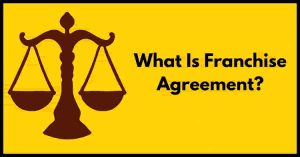
What is in a franchise agreement?
To start with, franchise is a type of business model in which a parent company grants another third party the right to use its name and business model.
Moreover, terms and conditions governing the franchise are present in a franchise contract, which includes the franchise fee, which is the fee paid by the franchisee to the parent company in exchange for the right to use its business model and name.
The franchise agreement also elaborates on the franchisee’s tenure, territorial scope, and ability to use the franchisor’s intellectual property rights, as well as other terms and conditions that would govern the franchise.
So, a franchise agreement covers all of the terms and conditions under which a parent firm will grant a franchise to a third party.
What information is included in a franchise agreement?
The Agreement of Franchise prepared by your franchise lawyer must include three elements. The Franchise agreement must include these elements’ information.
- There is a franchise cost.
- The franchisee must pay the franchisor a certain amount of money.
- A commercial name or trademark.

1. The Franchise’s Purpose
The Franchise Contract specifies the type of program or company that the buyer and seller intend to pursue, as well as the franchisee’s manner of operation and marketing strategy.
2. Intellectual Property Rights
In the franchise agreement, the franchisee is allowed the authority to utilize the franchise’s logos, trademarks, and slogans. The contract specifies brand trademarks and their limitations of usage.
3. Continuous Support and Training
The franchisor must train the franchisee and their employees. The franchisor’s technical and administrative support is in detail in the agreement.
4. Royalty payments
The royalty payment specifics and the payment mechanism are all included in the franchise agreement. The franchisee often pays royalties and ongoing fees monthly.
5. Operational Location and Territory
It is mandatory to mention the franchise location in the franchise agreement, and exclusive rights to the franchisee are assigned.
6. Termination
The several reasons for terminating a franchise agreement should have a place in the franchise contract.
If necessary, an arbitration clause exists to give the parties legal redress.
Franchise agreement examples
The franchisor and franchisee’s rights and obligations to license and sell a company’s intellectual property and licensing rights exist in the franchise agreement. Convenience stores are an excellent example of a company that uses franchise agreements, chain restaurants, and fast food.
Types of Franchise Agreement
Individuals, organizations, and investor groups can benefit from franchising since it offers tremendous business prospects. The range of franchisors, industries, and investment levels allows everyone from small single-unit family companies to major multi-million dollar investment groups wishing to broaden their holdings.
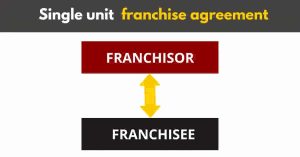
1. Single Unit Franchise Agreement
The single-unit franchise agreement is the most prevalent and typical franchise agreement. This type of agreement also spells forth the franchisee’s rights and responsibilities, and operations obligations.
On the other hand, franchisees are responsible for putting their own money into the business and expanding their managerial talents.
The franchise isn’t always the business’s management in a single-unit franchise. Some franchises will remain in their current positions, which some franchisors anticipate and promote as manager-run franchises.
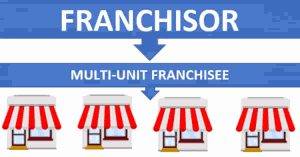
2. Multi-Unit Franchise Agreement
Firstly, the franchisor has the authority to give the franchisee many franchised units; in other words, this agreement permits the administration and establishment of multiple franchised units.
However, a multi-unit franchise must have solid financial capabilities that serve as a valuable asset in the company’s expansion.
Multi-unit franchisees are less inclined to third-party conflict resolution, so they’re more capable and prepared to push boundaries as the business market evolves.
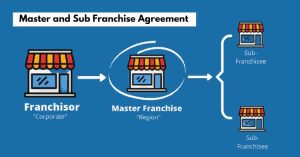
3. Master Franchise Agreement
The franchisor grants the master franchisee the right to deliver the franchisor’s complete variety of products and services in this form of agreement. In addition, the master franchisee has the authority to hire other sub-franchisees in their master franchise network.
As a result, the master franchisee becomes a franchisor to the franchisees who enter the network via its master franchise.
Because the Master Franchisee is generally significantly more informed and linked to the economy and culture of the specified zone, this sort of franchisor-franchisee contract. is often particularly suited for global affairs.
Example of the master franchise agreement.
Mcdonald’s appoints Master Franchisees worldwide where they don’t have their presence.
4. Sub franchise agreement
A franchisor may offer another party, widely termed a “master franchisee,” the authority to issue sub-franchise contracts in a designated location to franchisees (sub-franchisees).
In addition, A master franchise agreement governs the relationship between the master franchisee and the franchisor, and the master franchisee will award sub-franchisee identical conditions as the franchisor’s standard franchisor-franchisee contract.
When a franchisor intends to grow its franchise idea worldwide and lacks the essential knowledge of the industries, practices, and cultures of the countries involved in which it plans to expand, the franchisor will frequently employ a master franchisee.
5. Area Development Agreement
An Area Development Agreement, sometimes known as a Multi-Unit Development Agreement, is a contract between a franchisee and a franchisor that requires the franchisee to build a specified number of franchise outlets in a specific location within a specified timeline.
Rather than purchasing a single franchise, you engage in a franchisor-franchisee contract.to buy more franchises across time. You must spend a development charge in addition to the initial franchise price to obtain the license to build multiple locations.
The franchisor guarantees that no other franchisee can open a franchise in your area while your contract is still current with this agreement.
My Overview:
- The franchise agreement is a document or contract between the franchisor and franchisee prepared by your franchise attorney.
- I recommend the franchisor should explain the terms and conditions of the franchise agreement when selling the franchise opportunity to the franchisee. We always promote ethical practices during the complete franchise development process to avoid franchise disputes.
- You can hire a franchise dispute lawyer; as a franchisor or franchisee if you come across any franchise dispute during the franchise selling and the entire tenure of the franchisor-franchisee contract.
- We will be happy to solve your queries related to franchise disputes and provide free advice, and recommend franchise dispute lawyers if required.
- Also, you can use LegalZoom DIY services or franchise attorney advice to get the legal support you need. Legal assistance is there for you in any case. You may rely on their vetted network of lawyers for advice with no hourly fees and no office visits.
Wrapping up
To sum up, in Franchising, the paperwork necessary varies depending on your country. You can select the appropriate documents using the information provided above. An experienced franchisor should carefully craft the franchise agreement. Also, should have a proven track record of end-to-end service, a proven track record, and a long list of satisfied clients.
Let us revisit the above article, try to solve these, and reply in the comments.
1.A multiple-unit franchisee is a person who owns __.
2.International opportunities for franchising are becoming ___________.
LIST OF FRANCHISE DOCUMENTS
- Franchise Business Plan
- The Franchise Financial Plan
- A Franchise Agreement
- Franchise Operations Manual
- The Franchise Disclosure document
- Franchise Marketing plan
- Franchise Pitch deck
Let us know about the documents in your country in the comments section. What are your plans for expanding your company?
If you have any questions, please leave a comment, and we will be pleased to assist you!

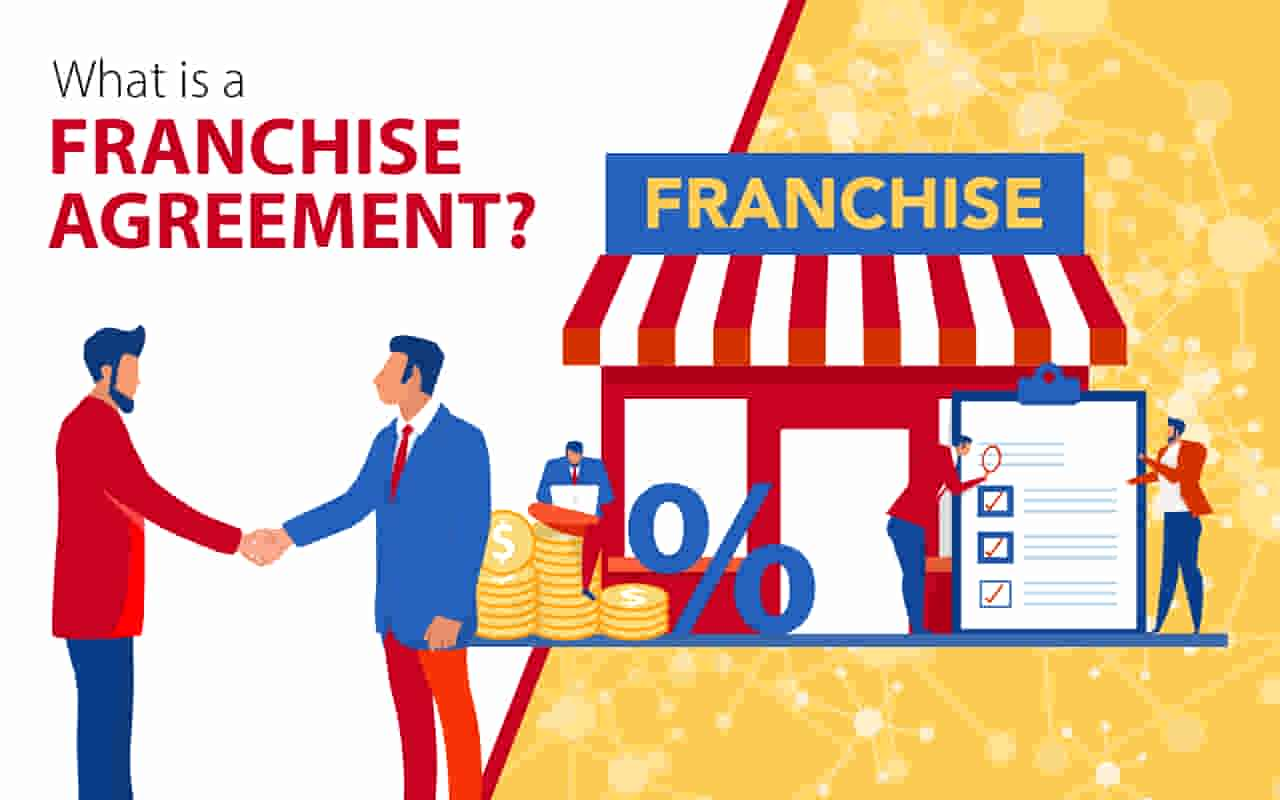
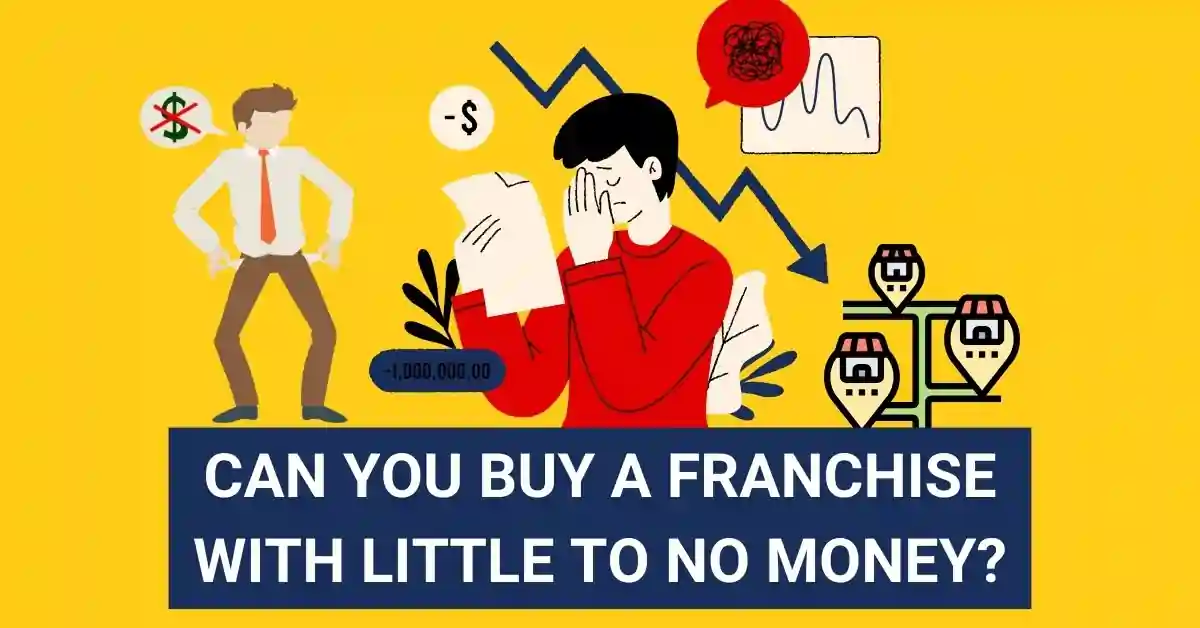



A franchise agreement is a legally binding contract between a franchisee and the franchisor.
A franchise agreement outlines the rights and obligations of both the franchisor and franchisee.
The franchise agreement is designed to protect the franchisor’s intellectual property and to ensure that the franchisee operates their business according to the franchisor’s standards. It also outlines the payment structure for the franchisee, such as the initial franchise fee and ongoing royalties. The franchise agreement covers a variety of topics, including the duration of the agreement, the territory of operation, the products and services that the franchisee can offer, and the marketing and advertising requirements.
The franchise agreement may also include provisions regarding training, support, and other services provided by the franchisor. It is important to read the franchise agreement carefully and understand the terms and conditions before signing. The franchise agreement should be reviewed and updated regularly to ensure that it is still relevant.
The franchise agreement should be reviewed by a qualified attorney to ensure that it is legally valid and enforceable.
The franchisor should also provide the franchisee with a copy of the agreement before signing.
The franchise agreement should clearly outline the expectations of the franchisor and franchisee. The franchise agreement should also include provisions for dispute resolution in the event of a disagreement between the parties.
The franchise agreement should be reviewed by a qualified accountant to ensure that the financial terms and conditions are fair and reasonable for both parties.The franchise agreement should be reviewed periodically to ensure that it is up-to-date and all terms and conditions are still applicable. The franchise agreement should be signed by both parties and witnessed by a third party to ensure that all terms and conditions are legally binding.